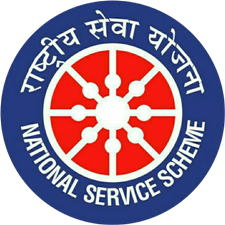National Service Scheme (NSS)

The symbol for the NSS has been based on the giant Rath Wheel of the world famous Konark Sun Temple (The Black Pagoda) situated in Orissa, India. The wheel portrays the cycle of creation, preservation and release. It signifies the movement in life across time and space, the symbol thus stands for continuity as well as change and implies the continuous striving of NSS for social change. The eight bars in the wheel represent the 24 hours of a day. The red colour indicates that the volunteer is full of young blood that is lively, active, energetic and full of high spirit. The navy blue colour indicates the cosmos of which the NSS is tiny part, ready to contribute its share for the welfare of the mankind.
Aims NSS:
The programme aims to inculcate social welfare in students, and to provide service to society without bias. NSS volunteers work to ensure that everyone who is needy gets help to enhance their standard of living and lead a life of dignity. In doing so, volunteers learn from people in villages how to lead a good life despite a scarcity of resources. it also provides help in natural and man-made disasters by providing food, clothing and first aid to the disaster victims. Subsequently, through various deliberations and refinements, the NSS was formed in 1969. Their motto was simple – “Not me, but You". Camps are held annually, funded by the government of India, and are usually located in a rural village or a city suburb. Volunteers may be involved in such activities as:
1) Cleaning
2) A forestation
3) Stage shows or a procession creating awareness of such issues as social problems, education and cleanliness
4) Awareness Rallies
5) Inviting doctors for health camps.
There are no predefined or preassigned tasks; it is left up to the volunteers to provide service in any way that is feasible. Camps typically last between a week and 10 days, although camps for shorter periods are also conducted by NSS.
 0721 - 2951901
0721 - 2951901






 0721 - 2951901
0721 - 2951901






